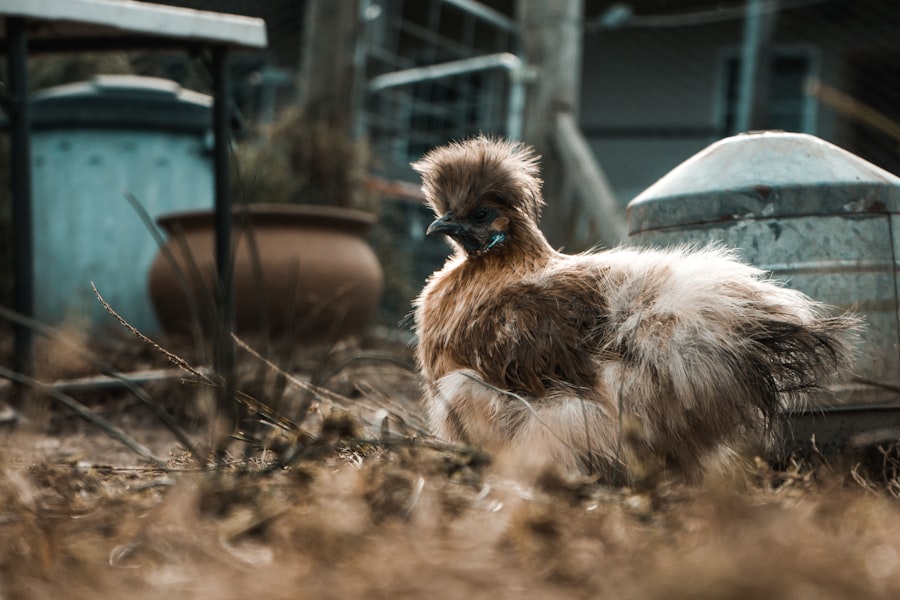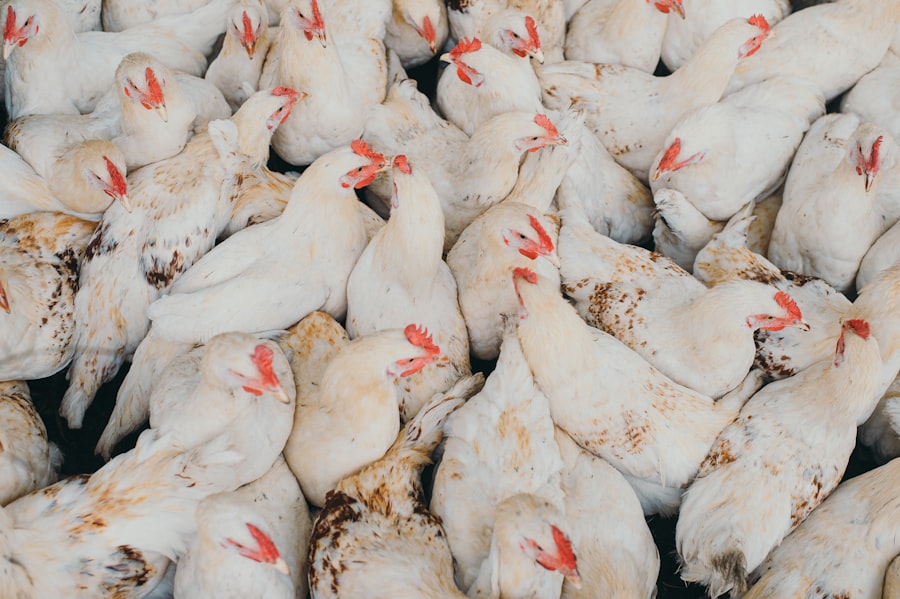Chickens communicate through a variety of vocalizations, each serving a specific purpose. Common sounds include clucking, cackling, crowing, and squawking. Clucking typically indicates contentment, often heard during foraging or roosting.
Cackling is a louder, more excited vocalization associated with egg-laying, usually accompanied by wing-flapping. Crowing is primarily performed by roosters to establish territory and communicate with other roosters. Squawking is an alarm call, signaling distress or danger.
Understanding these vocalizations is crucial for chicken owners to interpret their flock’s needs and behaviors. For instance, persistent squawking may indicate a threat or discomfort requiring immediate attention, while soft clucking suggests a calm, satisfied state. By recognizing and responding to these auditory cues, owners can better ensure the well-being of their chickens and provide appropriate care.
Chickens are social creatures that rely on these vocalizations for intra-flock communication. Attentiveness to their various calls allows owners to create a safer, more comfortable environment for their birds. This awareness is an essential aspect of responsible chicken ownership and contributes to the overall health and happiness of the flock.
Table of Contents
- 1 Creating a Cozy and Comfortable Coop
- 2 Providing Enrichment and Distractions
- 3 Implementing a Feeding and Watering Schedule
- 4 Keeping the Flock Healthy and Stress-Free
- 5 Training and Socializing Your Chickens
- 6 Seeking Professional Help if Necessary
- 7 FAQs
- 7.1 What are some ways to keep backyard chickens quiet?
- 7.2 Why do backyard chickens make noise?
- 7.3 Are there specific breeds of chickens that are quieter than others?
- 7.4 What are some tips for reducing noise from backyard chickens?
- 7.5 Are there any legal restrictions on keeping backyard chickens quiet?
Key Takeaways
- Chickens have different noise levels depending on their breed and individual personality
- Providing a cozy and comfortable coop can help reduce stress and noise levels in chickens
- Enrichment and distractions such as perches and toys can keep chickens entertained and reduce excessive noise
- Implementing a feeding and watering schedule can help regulate noise levels and keep chickens healthy
- Regular health check-ups and minimizing stressors can help keep the flock healthy and stress-free
- Training and socializing chickens from a young age can help reduce noise levels and create a more harmonious flock
- Seek professional help from a veterinarian or animal behaviorist if noise levels become a persistent issue
Creating a Cozy and Comfortable Coop
Key Elements of a Cozy Coop
It’s important to ensure that the coop is well-ventilated to prevent the buildup of moisture and ammonia, which can lead to respiratory issues for the chickens. Additionally, the coop should be kept clean and free of debris to prevent the spread of disease and parasites. Providing comfortable bedding, such as straw or wood shavings, can also help keep the coop cozy and warm for the chickens.
Designing a Functional Coop
In addition to providing a comfortable physical environment, it’s important to consider the layout and design of the coop. The coop should have nesting boxes for the hens to lay their eggs, as well as perches for the chickens to roost at night. It’s also important to provide access to food and water inside the coop to ensure that the chickens have everything they need at all times.
Benefits of a Cozy Coop
By creating a cozy and comfortable coop, chicken owners can ensure that their flock is happy and healthy. A well-designed coop can help prevent respiratory issues, disease, and parasites, and provide a comfortable and safe space for the chickens to thrive.
Providing Enrichment and Distractions

Providing enrichment and distractions is important for keeping chickens mentally stimulated and preventing boredom. Boredom can lead to negative behaviors such as feather pecking and aggression, so it’s important to provide activities that keep the chickens engaged. One way to provide enrichment is by offering a variety of perches, platforms, and hiding spots for the chickens to explore.
This can help encourage natural behaviors such as jumping, climbing, and roosting. Additionally, providing toys such as hanging treats or puzzle feeders can give the chickens something to peck at and play with. Another way to provide enrichment is by allowing the chickens access to a spacious outdoor area where they can forage for insects, dust bathe, and explore their surroundings.
This can help satisfy their natural instincts and provide mental stimulation. Additionally, rotating their outdoor environment or introducing new objects or obstacles can keep things interesting for the chickens. By providing enrichment and distractions, chicken owners can help keep their flock happy and healthy.
Providing enrichment and distractions is essential for keeping chickens mentally stimulated and preventing negative behaviors such as feather pecking and aggression. Offering a variety of perches, platforms, hiding spots, and toys can keep the chickens engaged and encourage natural behaviors such as jumping, climbing, and pecking. Allowing access to a spacious outdoor area where they can forage for insects, dust bathe, and explore can also provide mental stimulation and satisfy their natural instincts.
Rotating their outdoor environment or introducing new objects or obstacles can keep things interesting for the chickens. By providing enrichment and distractions, chicken owners can help ensure the well-being of their flock.
Implementing a Feeding and Watering Schedule
Implementing a feeding and watering schedule is important for ensuring that chickens receive the nutrition they need to stay healthy. Chickens should have access to fresh water at all times, so it’s important to regularly check their water supply and clean their waterers to prevent contamination. Additionally, chickens should be fed a balanced diet that includes a mix of grains, protein, vitamins, and minerals.
It’s important to provide access to high-quality feed that meets their nutritional needs. Feeding should be done at regular intervals throughout the day to ensure that all the chickens have an opportunity to eat. This can help prevent competition for food and ensure that all the chickens receive an adequate amount of nutrition.
Additionally, providing treats such as fruits, vegetables, or mealworms can help keep the chickens interested in their food and provide additional nutrients. By implementing a feeding and watering schedule, chicken owners can ensure that their flock receives the nutrition they need to stay healthy. Implementing a feeding and watering schedule is essential for ensuring that chickens receive the nutrition they need to stay healthy.
Chickens should have access to fresh water at all times, so it’s important to regularly check their water supply and clean their waterers to prevent contamination. Additionally, providing a balanced diet that includes grains, protein, vitamins, and minerals is important for meeting their nutritional needs. Feeding should be done at regular intervals throughout the day to prevent competition for food and ensure that all the chickens receive an adequate amount of nutrition.
Providing treats such as fruits, vegetables, or mealworms can also help keep the chickens interested in their food and provide additional nutrients.
Keeping the Flock Healthy and Stress-Free
Keeping the flock healthy and stress-free is essential for ensuring their well-being. Regular health checks should be conducted to monitor for signs of illness or injury, such as changes in behavior or appearance. It’s important to promptly address any health issues by seeking veterinary care if necessary.
Additionally, maintaining a clean environment by regularly cleaning the coop and removing waste can help prevent disease and parasites. Reducing stress in the flock is also important for their overall health. This can be achieved by providing a comfortable physical environment, as well as minimizing disruptions or changes in routine.
Additionally, introducing new birds into the flock should be done gradually to prevent aggression or territorial disputes. By keeping the flock healthy and stress-free, chicken owners can ensure that their chickens live happy and fulfilling lives. Keeping the flock healthy and stress-free is essential for ensuring their well-being.
Regular health checks should be conducted to monitor for signs of illness or injury, with prompt veterinary care sought if necessary. Maintaining a clean environment by regularly cleaning the coop can help prevent disease and parasites. Reducing stress in the flock can be achieved by providing a comfortable physical environment and minimizing disruptions or changes in routine.
Introducing new birds into the flock should be done gradually to prevent aggression or territorial disputes. By keeping the flock healthy and stress-free, chicken owners can ensure that their chickens live happy lives.

Building Trust and Comfort
Spending time with your chickens on a regular basis can help them become more comfortable around you and less fearful of human interaction. This can make it easier to handle them for health checks or other necessary tasks.
Effective Flock Management
Training your chickens to come when called or respond to certain cues can also be helpful in managing your flock. For example, you can train them to come inside at night by using treats or calling them with a specific sound or word.
Reducing Aggression and Conflict
Socializing your chickens with each other can also help reduce aggression within the flock by allowing them to establish a pecking order without serious conflict. By training and socializing your chickens, you can build a stronger bond with your flock while also making it easier to manage them on a day-to-day basis.
Seeking Professional Help if Necessary
Seeking professional help if necessary is important for addressing any health or behavioral issues within your flock. If you notice any signs of illness or injury in your chickens, it’s important to seek veterinary care as soon as possible. A veterinarian will be able to diagnose any health issues your flock may have and provide appropriate treatment.
If you’re experiencing behavioral issues within your flock that you’re unable to manage on your own, seeking advice from an animal behaviorist or experienced chicken keeper may be beneficial. They can provide guidance on how to address specific behavioral problems within your flock while also offering tips on how to improve your management practices. By seeking professional help if necessary, you can ensure that any health or behavioral issues within your flock are addressed promptly while also gaining valuable knowledge on how to better care for your chickens.
Seeking professional help if necessary is important for addressing any health or behavioral issues within your flock promptly while gaining valuable knowledge on how to better care for your chickens. If you notice any signs of illness or injury in your chickens, it’s important to seek veterinary care as soon as possible while seeking advice from an animal behaviorist or experienced chicken keeper may be beneficial if you’re experiencing behavioral issues within your flock that you’re unable to manage on your own. In conclusion, understanding the noise levels of chickens is crucial for interpreting their needs and behaviors while creating a cozy coop with proper ventilation, cleanliness, layout design elements like nesting boxes are essential for their well-being.
Providing enrichment through various activities like perches or outdoor access keeps them mentally stimulated while implementing feeding schedules ensures proper nutrition intake. Keeping them healthy through regular checks reduces stress while training them builds trust between owner & flock; seeking professional help if necessary ensures prompt resolution of any issues within your flock.
If you’re looking for more tips on keeping backyard chickens, you might be interested in this article on how to build a Hannah Montana chicken coop. It offers advice on creating a comfortable and functional living space for your feathered friends.
FAQs
What are some ways to keep backyard chickens quiet?
Some ways to keep backyard chickens quiet include providing enough space for them to roam, keeping them entertained with toys and activities, and ensuring they have a comfortable and stress-free environment.
Why do backyard chickens make noise?
Backyard chickens make noise for various reasons, including to communicate with each other, to express excitement or distress, and to establish their territory.
Are there specific breeds of chickens that are quieter than others?
Yes, some chicken breeds are known to be quieter than others. For example, breeds such as Silkies, Orpingtons, and Sussex are generally considered to be quieter and more docile.
What are some tips for reducing noise from backyard chickens?
Some tips for reducing noise from backyard chickens include providing them with enough space, keeping them well-fed and entertained, and addressing any potential sources of stress or discomfort.
Are there any legal restrictions on keeping backyard chickens quiet?
Some local ordinances and regulations may have restrictions on the noise levels produced by backyard chickens. It’s important to check with local authorities to ensure compliance with any applicable laws or regulations.
Meet Walter, the feathered-friend fanatic of Florida! Nestled in the sunshine state, Walter struts through life with his feathered companions, clucking his way to happiness. With a coop that’s fancier than a five-star hotel, he’s the Don Juan of the chicken world. When he’s not teaching his hens to do the cha-cha, you’ll find him in a heated debate with his prized rooster, Sir Clucks-a-Lot. Walter’s poultry passion is no yolk; he’s the sunny-side-up guy you never knew you needed in your flock of friends!







